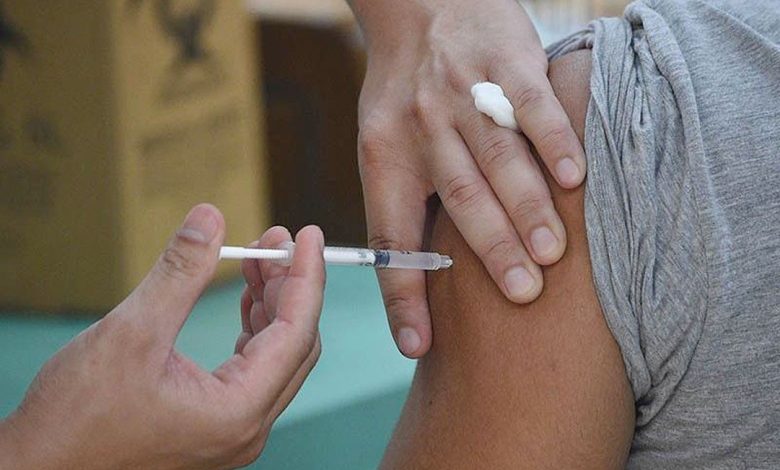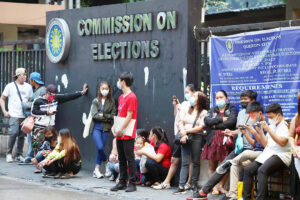Analysts warn against compulsory vaccination

By Kyle Aristophere T. Atienza, Reporter
and Alyssa Nicole O. Tan and Russell Louis C. Ku
REQUIRING people to get vaccinated against the coronavirus may lead to political divisions and tarnish the credibility of the government’s pandemic response, according to analysts.
“Mandatory vaccination has no legal basis and may even be violative of some persons’ human rights,” Party-list Rep. Carlo Isagani T. Zarate said in a Facebook Messenger chat. The state is partly to blame for vaccine hesitancy because it needs to educate people about it, he added.
“The problem is that the administration has enforced military solutions and has not performed to control the pandemic” he said. “Now, they plan to force and scare people into getting vaccinated, instead of convincing them with a good explanation.”
Last week, vaccine czar Carlito G. Galvez, Jr. said he was in favor of making coronavirus vaccinations compulsory, otherwise Filipinos would be at risk.
Mr. Zarate cited the need for information campaigns “so that more Filipinos would see the importance of vaccination in the fight against this pandemic.” “Public health education is key.”
“Forcing people to get vaccinated does not take into consideration the fact that there are actually still more people who really want to get vaccinated,” said Maria Ela L. Atienza, a political science professor at the University of the Philippines.
A poll conducted by the Social Weather Stations from Sept. 27 to 30 showed that 64% of adult Filipinos were now willing to get vaccinated against the coronavirus, up from 55% in June.
The government wants to increase the number of vaccinated people “so that they can claim it as an achievement,” Ms. Atienza said in a Viber message. “That is why they want to make it mandatory.”
“There may be legal challenges in court should this proposal push through,” she added.
More businesses around the world have been prioritizing fully vaccinated job seekers. Critics have said making employment conditions based on vaccination status is highly discriminatory.
In the Philippines, business groups have been urging the government to allow the private sector to impose stricter requirements on unvaccinated employees and patrons, and to decline unvaccinated job applicants.
Last month, President Rodrigo R. Duterte said government workers who refuse to be vaccinated should resign.
A bill seeking to make COVID-19 vaccination mandatory is pending at the House of Representatives.
Health Undersecretary Maria Rosario S. Vergeire has said compulsory vaccinations would help the country achieve herd immunity.
Ramon Lorenzo Luis “Renzo” R. Guinto, a medical doctor and associate professor of global public health at the St. Luke’s Medical Center College of Medicine, said the right to refuse vaccines is not absolute “especially if there is a strong case for improving the overall public welfare — including the health of the one being immunized.”
“In a health emergency such as this pandemic, the government can argue that this temporary suspension of the right to choose can lead to lifelong protection of health and of that same right to choose,” he said in a Facebook Messenger chat. “If you die of COVID-19, there is no more right to choose, no human rights, no civil liberties to enjoy.”
Mandatory vaccinations could lead to boycott and lowered business income, said Bienvenido S. Oplas, Jr., head of think tank Minimal Government Thinkers.
The state should let businesses impose vaccination policies on their own if necessary and face the consequences, he said in a Viber message.
Philippine Chamber of Commerce and Industry (PCCI) President Benedicto V. Yujuico in an e-mail said the group favors both the “no vaccine, no entry” and “no vaccine, no work” policy.
He also said there is no need for legislation to enforce the policy, which he said could fast-track economic recovery through increased consumer confidence.
Mr. Yujuico said people have a right to choose not to get vaccinated, but “it is not their right to contaminate and expose others to COVID.” “Therefore, they must accept the consequences of being unvaccinated for the good of the majority.”
Michael L. Ricafort, chief economist at Rizal Commercial Banking Corp. said the positives of mandatory vaccination outweigh the negatives in terms of economic impact.
This would lead to a further reopening of the economy, create more jobs and livelihood, he added.
Gene A. Nisperos, a board member of the Community Medicine Development Foundation, said forcing people to get vaccinated is wrong “legally and ethically.” He added that the state’s vaccination program is flawed.
“We respect patient’s rights and uphold their autonomy,” he said in a Viber message. “At the very least, intake of medicine is part of shared decision-making. Thus, convincing the patient thru painstaking explanation is key.”
Trade Union Congress of the Philippines (TUCP) spokesman Alan A. Tanjusay said low vaccine supply in some provinces remained a problem.
“Many. of the workers are willing to get vaccinated but they have accessibility problems,” he said in a Viber message.
He added making vaccination mandatory could worsen discrimination against unvaccinated workers.
“It’s discriminatory and unfair to workers who have a difficulty accessing limited and inadequate supply of vaccines, and to employers and business owners who can’t buy vaccines for their employees,” he said.
The Philippines aims to give out as many as 1.5 million vaccine doses daily starting Nov. 20. The government has started inoculating children aged 12 to 17 years old and is planning to vaccinate children below 12 years next year.




